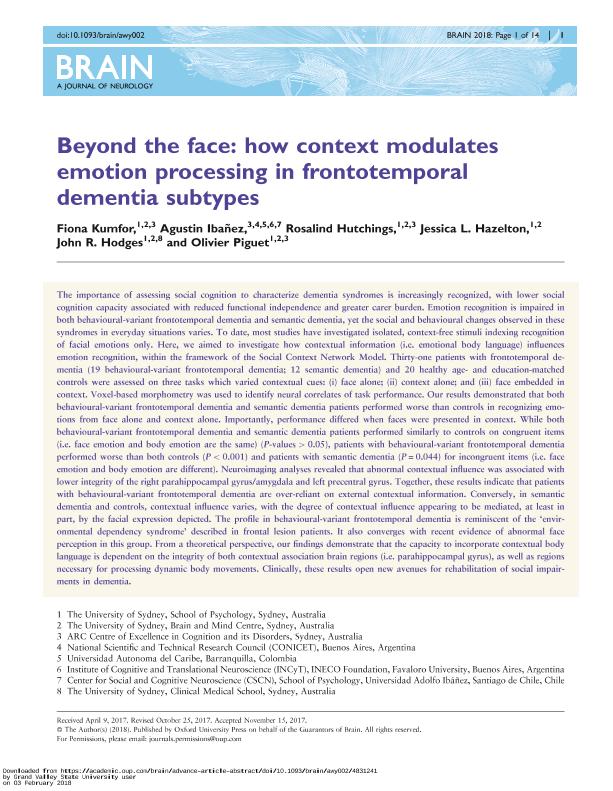Mostrar el registro sencillo del ítem
dc.contributor.author
Kumfor, Fiona
dc.contributor.author
Ibañez, Agustin Mariano

dc.contributor.author
Hutchings, Rosalind
dc.contributor.author
Hazelton, Jessica L.
dc.contributor.author
Hodges, John R.
dc.contributor.author
Piguet, Olivier
dc.date.available
2020-03-05T20:24:16Z
dc.date.issued
2018-04
dc.identifier.citation
Kumfor, Fiona; Ibáñez Barassi, Agustín Mariano; Hutchings, Rosalind; Hazelton, Jessica L.; Hodges, John R.; et al.; Beyond the face: How context modulates emotion processing in frontotemporal dementia subtypes; Oxford University Press; Brain; 141; 4; 4-2018; 1172-1185
dc.identifier.issn
0006-8950
dc.identifier.uri
http://hdl.handle.net/11336/98873
dc.description.abstract
The importance of assessing social cognition to characterize dementia syndromes is increasingly recognized, with lower social cognition capacity associated with reduced functional independence and greater carer burden. Emotion recognition is impaired in both behavioural-variant frontotemporal dementia and semantic dementia, yet the social and behavioural changes observed in these syndromes in everyday situations varies. To date, most studies have investigated isolated, context-free stimuli indexing recognition of facial emotions only. Here, we aimed to investigate how contextual information (i.e. emotional body language) influences emotion recognition, within the framework of the Social Context Network Model. Thirty-one patients with frontotemporal dementia (19 behavioural-variant frontotemporal dementia; 12 semantic dementia) and 20 healthy age- and education-matched controls were assessed on three tasks which varied contextual cues: (i) face alone; (ii) context alone; and (iii) face embedded in context. Voxel-based morphometry was used to identify neural correlates of task performance. Our results demonstrated that both behavioural-variant frontotemporal dementia and semantic dementia patients performed worse than controls in recognizing emotions from face alone and context alone. Importantly, performance differed when faces were presented in context. While both behavioural-variant frontotemporal dementia and semantic dementia patients performed similarly to controls on congruent items (i.e. face emotion and body emotion are the same) (P-values 4 0.05), patients with behavioural-variant frontotemporal dementia performed worse than both controls (P 5 0.001) and patients with semantic dementia (P = 0.044) for incongruent items (i.e. face emotion and body emotion are different). Neuroimaging analyses revealed that abnormal contextual influence was associated with lower integrity of the right parahippocampal gyrus/amygdala and left precentral gyrus. Together, these results indicate that patients with behavioural-variant frontotemporal dementia are over-reliant on external contextual information. Conversely, in semantic dementia and controls, contextual influence varies, with the degree of contextual influence appearing to be mediated, at least in part, by the facial expression depicted. The profile in behavioural-variant frontotemporal dementia is reminiscent of the ‘environmental dependency syndrome’ described in frontal lesion patients. It also converges with recent evidence of abnormal face perception in this group. From a theoretical perspective, our findings demonstrate that the capacity to incorporate contextual body language is dependent on the integrity of both contextual association brain regions (i.e. parahippocampal gyrus), as well as regions necessary for processing dynamic body movements. Clinically, these results open new avenues for rehabilitation of social impairments in dementia.
dc.format
application/pdf
dc.language.iso
eng
dc.publisher
Oxford University Press

dc.rights
info:eu-repo/semantics/openAccess
dc.rights.uri
https://creativecommons.org/licenses/by-nc-sa/2.5/ar/
dc.subject
BEHAVIOUR
dc.subject
EMOTION
dc.subject
FRONTOTEMPORAL DEMENTIA
dc.subject
PRIMARY PROGRESSIVE APHASIA
dc.subject.classification
Neurociencias

dc.subject.classification
Medicina Básica

dc.subject.classification
CIENCIAS MÉDICAS Y DE LA SALUD

dc.title
Beyond the face: How context modulates emotion processing in frontotemporal dementia subtypes
dc.type
info:eu-repo/semantics/article
dc.type
info:ar-repo/semantics/artículo
dc.type
info:eu-repo/semantics/publishedVersion
dc.date.updated
2020-03-05T14:59:51Z
dc.journal.volume
141
dc.journal.number
4
dc.journal.pagination
1172-1185
dc.journal.pais
Reino Unido

dc.journal.ciudad
Oxford
dc.description.fil
Fil: Kumfor, Fiona. Arc Centre of Excellence in Cognition and its Disorders; Australia. University of Sydney; Australia
dc.description.fil
Fil: Ibáñez Barassi, Agustín Mariano. Universidad Autónoma del Caribe; Colombia. Arc Centre of Excellence in Cognition and its Disorders; Australia. Universidad Adolfo Ibañez; Chile. Consejo Nacional de Investigaciones Científicas y Técnicas. Oficina de Coordinación Administrativa Houssay. Instituto de Neurociencia Cognitiva. Fundación Favaloro. Instituto de Neurociencia Cognitiva; Argentina
dc.description.fil
Fil: Hutchings, Rosalind. University of Sydney; Australia. Arc Centre of Excellence in Cognition and its Disorders; Australia
dc.description.fil
Fil: Hazelton, Jessica L.. University of Sydney; Australia
dc.description.fil
Fil: Hodges, John R.. University of Sydney; Australia
dc.description.fil
Fil: Piguet, Olivier. Arc Centre of Excellence in Cognition and its Disorders; Australia. University of Sydney; Australia
dc.journal.title
Brain

dc.relation.alternativeid
info:eu-repo/semantics/altIdentifier/url/https://academic.oup.com/brain/advance-article/doi/10.1093/brain/awy002/4831241
dc.relation.alternativeid
info:eu-repo/semantics/altIdentifier/doi/http://dx.doi.org/10.1093/brain/awy002
Archivos asociados
